Although we are against amalgamates, we also have a problem with „amalgamate drainage“!

We would like to start off by explaining just why we are against amalgamate: it is
o) unaesthetic
o) it puts an additional strain on the dentist and other personnel during application and drilling
o) it changes over time and makes renewed drilling necessary, even with the best dental care
Reason enough to reject amalgamate!
–
–
Let us now turn to amalgamate drainage. First we must discuss mercury contamination. There are two kinds: acute and chronic.
 Acute contamination or poisoning would often occur when e.g. small children played with a thermometer and ended up breaking it and swallowing the silvery liquid. Acute poisoning is usually characterized by burns, in our „thermometer“ example these would be in the mouth, esophagus and stomach.
Acute contamination or poisoning would often occur when e.g. small children played with a thermometer and ended up breaking it and swallowing the silvery liquid. Acute poisoning is usually characterized by burns, in our „thermometer“ example these would be in the mouth, esophagus and stomach.
Depending on the severity of the burns, there may be scarring with all the attendant consequences. What might these be? Well, in the case of the esophagus – a muscular tube which transports food, extreme burns can destroy muscle tissue and scars can form! These scars make the „tube“ narrower, to the point where it may need to be removed and „replaced“ by a piece of small intestine.
–
„Drainage“ does not help in an acute case of mercury contamination, once the damage is done it is too late!
–
We now come to the next item on our list, chronic mercury contamination. Small doses of organic mercury compounds, ingested over a long period of time, lead to mercury deposits in the brain. As mercury is always deposited in certain areas of the brain, chronic mercury contamination always causes the same symptoms – shaking hands, loss of balance, problems walking (as in the final stages of Parkinson’s disease), depression and narrowing of thought processes. Dentists used to be especially prone to these effects.
–
As you can see, there is no such thing as slight or „possible“ mercury contamination, you either have it or you don’t, these are severe symptoms!
–
Now, many doctors offer various substances which supposedly aid in mercury drainage, such as e.g.
- Chlorela
- Spirulina
- Zinc
- Vitamin C
- Phytohypophyson
But many of these substances do not even make it through the intestine, being not much more than roughage,they are simply excreted. They never make it into the brain, and not even coming into contact with the mercury, these substances can hardly be expected to bind and remove it from the body.
–
The Cochrane database (under „evidence-based medicine“) contains no literature on this subject.
–
Don’t get us wrong, but for the sake of our readers we wanted to find out how drainage works. The authors of this website only recommend methods of treatment they would be prepared to use on their own children – and amalgamate drainage would not be one of them!
–
If you are a doctor with an interest in this field, please write us and our biologists, statisticians and medical professionals will take a look at your findings. Should these provide adequate proof, then we would be happy to finance a trip to India and China.
There we can take part in a „field study“, since there are many people there who suffer from chronic or acute mercury poisoning caused by computer scraps.
–
As yet, there has been no documented case of successful treatment of mercury contamination, either in a hospital or treatment center. These institutions do not even attempt to treat mercury poisoning by „drainage“, it is only possible to treat the symptoms – and try to make those less acute.
–
When we say documented case, we do not mean cases of people in European countries who simply suffer from an „allergy“ caused by problems on the job, mobbing, fear of loss, isolation or lack of empathy on the part of a doctor. Of course these people feel better after treatment using kinesiology, alternative medicine and having people simply „listen“ to them. We mean real cases of mercury poisoning!
VN:F [1.9.22_1171]
Rating: 1.0/5 (1 vote cast)
VN:F [1.9.22_1171]
 A good friend of our Dental News Team discovered blood in his urine. After the problem persisted for a few days, he did the right thing and went to a hospital for help.
A good friend of our Dental News Team discovered blood in his urine. After the problem persisted for a few days, he did the right thing and went to a hospital for help.










